The Railway Children Read online
Page 2
‘Did you ask her?’ said Roberta, with scorn.
‘Yes, I did!’ said Peter, angrily. ‘If you could go to bed without caring whether Mother was worried or not, I couldn’t. So there.’
‘I don’t think we ought to ask the servants things Mother doesn’t tell us,’ said Roberta.
‘That’s right, Miss Goody-Goody,’ said Peter, ‘preach away.’
‘I’m not goody,’ said Phyllis, ‘but I think Bobbie’s right this time.’
‘Of course. She always is. In her own opinion,’ said Peter.
‘Oh, don’t!’ cried Roberta, putting down her egg-spoon; ‘don’t let’s be horrid to each other. I’m sure some dire calamity is happening. Don’t let’s make it worse!’
‘Who began, I should like to know?’ said Peter.
Roberta made an effort, and answered:
‘I did, I suppose, but –’
‘Well, then,’ said Peter, triumphantly. But before he went to school he thumped his sister between the shoulders and told her to cheer up.
The children came home to one o’clock dinner, but Mother was not there. And she was not there at tea-time.
It was nearly seven before she came in, looking so ill and tired that the children felt they could not ask her any questions. She sank into an armchair. Phyllis took the long pins out of her hat, while Roberta took off her gloves, and Peter unfastened her walking-shoes and fetched her soft velvety slippers for her.
When she had had a cup of tea, and Roberta had put eau-de-Cologne on her poor head that ached, Mother said:
‘Now, my darlings, I want to tell you something. Those men last night did bring very bad news, and Father will be away for some time. I am very worried about it, and I want you all to help me, and not to make things harder for me.’
‘As if we would!’ said Roberta, holding Mother’s hand against her face.
‘You can help me very much,’ said Mother, ‘by being good and happy and not quarrelling when I’m away’ – Roberta and Peter exchanged guilty glances – ‘for I shall have to be away a good deal.’
‘We won’t quarrel. Indeed we won’t,’ said everybody. And meant it, too.
‘Then,’ Mother went on, ‘I want you not to ask me any questions about this trouble; and not to ask anybody else any questions.’
Peter cringed and shuffled his boots on the carpet.
‘You’ll promise this, too, won’t you?’ said Mother.
‘I did ask Ruth,’ said Peter, suddenly. ‘I’m very sorry, but I did.’
‘And what did she say?’
‘She said I should know soon enough.’
‘It isn’t necessary for you to know anything about it,’ said Mother; ‘it’s about business, and you never do understand business, do you?’
‘No,’ said Roberta; ‘is it something to do with Government?’ For Father was in a Government Office.
‘Yes,’ said Mother. ‘Now it’s bed-time, my darlings. And don’t you worry. It’ll all come right in the end.’
‘Then don’t you worry either, Mother,’ said Phyllis, ‘and we’ll all be as good as gold.’
Mother sighed and kissed them.
‘We’ll begin being good the first thing tomorrow morning,’ said Peter, as they went upstairs.
‘Why not now?’ said Roberta.
‘There’s nothing to be good about now, silly,’ said Peter.
‘We might begin to try to feel good,’ said Phyllis, ‘and not call names.’
‘Who’s calling names?’ said Peter. ‘Bobbie knows right enough that when I say “silly”, it’s just the same as if I said Bobbie.’
‘Well,’ said Roberta.
‘No, I don’t mean what you mean. I mean it’s just a – what is it Father calls it? – a germ of endearment! Good night.’
The girls folded up their clothes with more than usual neatness – which was the only way of being good that they could think of.
‘I say,’ said Phyllis, smoothing out her pinafore, ‘you used to say it was so dull – nothing happening, like in books. Now something has happened.’
‘I never wanted things to happen to make Mother unhappy,’ said Roberta. ‘Everything’s perfectly horrid.’
Everything continued to be perfectly horrid for some weeks.
Mother was nearly always out. Meals were dull and dirty. The between-maid was sent away, and Aunt Emma came on a visit. Aunt Emma was much older than Mother. She was going abroad to be a governess. She was very busy getting her clothes ready, and they were very ugly, dingy clothes, and she had them always littering about, and the sewing-machine seemed to whirl – on and on all day and most of the night. Aunt Emma believed in keeping children in their proper places. And they more than returned the compliment. Their idea of Aunt Emma’s proper place was anywhere where they were not. So they saw very little of her. They preferred the company of the servants, who were more amusing. Cook, if in a good temper, could sing comic songs, and the housemaid, if she happened not to be offended with you, could imitate a hen that has laid an egg, a bottle of champagne being opened, and could mew like two cats fighting. The servants never told the children what the bad news was that the gentlemen had brought to Father. But they kept hinting that they could tell a great deal if they chose – and this was not comfortable.
One day when Peter had made a booby trap over the bath-room door, and it had acted beautifully as Ruth passed through, that red-haired parlour-maid caught him and boxed his ears.
‘You’ll come to a bad end,’ she said furiously, ‘you nasty little limb, you! If you don’t mend your ways, you’ll go where your precious Father’s gone, so I tell you straight!’
Roberta repeated this to her Mother, and next day Ruth was sent away.
Then came the time when Mother came home and went to bed and stayed there two days and the Doctor came, and the children crept wretchedly about the house and wondered if the world was coming to an end.
Mother came down one morning to breakfast, very pale and with lines on her face that used not to be there. And she smiled, as well as she could, and said:
‘Now, my pets, everything is settled. We’re going to leave this house, and go and live in the country. Such a ducky dear little white house. I know you’ll love it.’
A whirling week of packing followed – not just packing clothes, like when you go to the seaside, but packing chairs and tables, covering their tops with sacking and their legs with straw.
All sorts of things were packed that you don’t pack when you go to the seaside. Crockery, blankets, candlesticks, carpets, bedsteads, saucepans, and even fenders and fire-irons.
The house was like a furniture warehouse. I think the children enjoyed it very much. Mother was very busy, but not too busy now to talk to them, and read to them, and even to make a bit of poetry for Phyllis to cheer her up when she fell down with a screwdriver and ran it into her hand.
‘Aren’t you going to pack this, Mother?’ Roberta asked, pointing to the beautiful cabinet inlaid with red turtleshell and brass.
‘We can’t take everything,’ said Mother.
‘But we seem to be taking all the ugly things,’ said Roberta.
‘We’re taking the useful ones,’ said Mother; ‘we’ve got to play at being Poor for a bit, my chickabiddy.’
When all the ugly useful things had been packed up and taken away in a van by men in green-baize aprons, the two girls and Mother and Aunt Emma slept in the two spare rooms where the furniture was all pretty. All their beds had gone. A bed was made up for Peter on the drawing-room sofa.
‘I say, this is larks,’ he said, wriggling joyously, as Mother tucked him up. ‘I do like moving! I wish we moved once a month.’
Mother laughed.
‘I don’t!’ she said. ‘Good night, Peterkin.’
As she turned away Roberta saw her face. She never forgot it.
‘Oh, Mother,’ she whispered all to herself as she got into bed, ‘how brave you are! How I love you! Fancy being brave enough to
laugh when you’re feeling like that!’
Next day boxes were filled, and boxes and more boxes; and then late in the afternoon a cab came to take them to the station.
Aunt Emma saw them off. They felt that they were seeing her off, and they were glad of it.
‘But, oh, those poor little foreign children that she’s going to governess!’ whispered Phyllis. ‘I wouldn’t be them for anything!’
At first they enjoyed looking out of the window, but when it grew dusk they grew sleepier and sleepier, and no one knew how long they had been in the train when they were roused by Mother’s shaking them gently and saying:
‘Wake up, dears. We’re there.’
They woke up, cold and melancholy, and stood shivering on the draughty platform while the baggage was taken out of the train. Then the engine, puffing and blowing, set to work again, and dragged the train away. The children watched the tail-lights of the guard’s van disappear into the darkness.
This was the first train the children saw on that railway which was in time to become so very dear to them. They did not guess then how they would grow to love the railway, and how soon it would become the centre of their new life nor what wonders and changes it would bring to them. They only shivered and sneezed and hoped the walk to the new house would not be long. Peter’s nose was colder than he ever remembered it to have been before. Roberta’s hat was crooked, and the elastic seemed tighter than usual. Phyllis’s shoe-laces had come undone.
‘Come,’ said Mother, ‘we’ve got to walk. There aren’t any cabs here.’
The walk was dark and muddy. The children stumbled a little on the rough road, and once Phyllis absently fell into a puddle, and was picked up damp and unhappy. There were no gas-lamps on the road, and the road was uphill. The cart went at a slow pace, and they followed the gritty crunch of its wheels. As their eyes got used to the darkness, they could see the mound of boxes swaying dimly in front of them.
A long gate had to be opened for the cart to pass through, and after that the road seemed to go across fields – and now it went downhill. Presently a great dark lumpish thing showed over to the right.
‘There’s the house,’ said Mother. ‘I wonder why she’s shut the shutters.’
‘Who’s she?’ asked Roberta.
‘The woman I engaged to clean the place, and put the furniture straight and get supper.’
There was a low wall, and trees inside.
‘That’s the garden,’ said Mother.
‘It looks more like a dripping-pan full of black cabbages,’ said Peter.
The cart went on along by the garden wall, and round to the back of the house, and here it clattered into a cobble-stoned yard and stopped at the back door.
There was no light in any of the windows.
Everyone hammered at the door, but no one came.
The man who drove the cart said he expected Mrs Viney had gone home.
‘You see your train was that late,’ said he.
‘But she’s got the key,’ said Mother. ‘What are we to do?’
‘Oh, she’ll have left that under the doorstep,’ said the cart man; ‘folks do hereabouts.’ He took the lantern off his cart and stooped.
‘Ay, here it is, right enough,’ he said.
He unlocked the door and went in and set his lantern on the table.
‘Got e’er a candle?’ said he.
‘I don’t know where anything is.’ Mother spoke rather less cheerfully than usual.
He struck a match. There was a candle on the table, and he lighted it. By its thin little glimmer the children saw a large bare kitchen with a stone floor. There were no curtains, no hearth-rug. The kitchen table from home stood in the middle of the room. The chairs were in one corner, and the pots, pans, brooms, and crockery in another. There was no fire, and the black grate showed cold, dead ashes.
As the cart man turned to go out after he had brought in the boxes, there was a rustling, scampering sound that seemed to come from inside the walls of the house.
‘Oh, what’s that?’ cried the girls.
‘It’s only the rats,’ said the cart man. And he went away and shut the door, and the sudden draught of it blew out the candle.
‘Oh, dear,’ said Phyllis, ‘I wish we hadn’t come!’ and she knocked a chair over.
‘Only the rats!’ said Peter, in the dark.
2
Peter’s Coal-Mine
‘What fun!’ said Mother, in the dark, feeling for the matches on the table. ‘How frightened the poor mice were – I don’t believe they were rats at all.’
She struck a match and relighted the candle and everyone looked at each other by its winky, blinky light.
‘Well,’ she said, ‘you’ve often wanted something to happen and now it has. This is quite an adventure, isn’t it? I told Mrs Viney to get us some bread and butter and meat and things, and to have supper ready. I suppose she’s laid it in the dining-room. So let’s go and see.’
The dining-room opened out of the kitchen. It looked much darker than the kitchen when they went in with the one candle, because the kitchen was whitewashed, but the dining-room was dark wood from floor to ceiling, and across the ceiling there were heavy black beams. There was a muddle maze of dusty furniture – the breakfast-room furniture from the old home where they had lived all their lives. It seemed a very long time ago, and a very long way off.
There was a table certainly, and there were chairs, but there was no supper.
‘Let’s look in the other rooms,’ said Mother; and they looked. And in each room was the same kind of blundering half-arrangement of furniture, and fire-irons and crockery, and all sorts of odd things on the floor, but there was nothing to eat; even in the pantry there were only a rusty cake-tin and a broken plate with whitening mixed in it.
‘What a horrid old woman!’ said Mother; ‘she’s just walked off with the money and not got us anything to eat at all.’
‘Then shan’t we have any supper at all?’ asked Phyllis, dismayed, stepping back on to a soap-dish that cracked responsively.
‘Oh, yes,’ said Mother, ‘only it’ll mean unpacking one of those big cases that we put in the cellar. Phil, do mind where you’re walking to, there’s a dear. Peter, hold the light.’
The cellar door opened out of the kitchen. There were five wooden steps leading down. It wasn’t a proper cellar at all, the children thought, because its ceiling went up as high as the kitchen’s. A bacon-rack hung under its ceiling. There was wood in it, and coal. Also the big cases.
Peter held the candle, all on one side, while Mother tried to open the great packing-case. It was very securely nailed down.
‘Where’s the hammer?’ asked Peter.
‘That’s just it,’ said Mother. ‘I’m afraid it’s inside the box. But there’s a coal-shovel – and there’s the kitchen poker.’
And with these she tried to get the case open.
‘Let me do it,’ said Peter, thinking he could do it better himself. Everyone thinks this when he sees another person stirring a fire, or opening a box, or untying a knot in a bit of string.
‘You’ll hurt your hands, Mammy,’ said Roberta; ‘let me.’
‘I wish Father was here,’ said Phyllis; ‘he’d get it open in two shakes. What are you kicking me for, Bobbie?’
‘I wasn’t,’ said Roberta.
Just then the first of the long nails in the packing-case began to come out with a scrunch. Then a lath was raised and then another, till all four stood up with long nails in them shining fiercely like iron teeth in the candle-light.
‘Hooray!’ said Mother; ‘here are some candles – the very first thing! You girls go and light them. You’ll find some saucers and things. Just drop a little candle-grease in the saucer and stick the candle upright in it.’
‘How many shall we light?’
‘As many as ever you like,’ said Mother, gaily. ‘The great thing is to be cheerful. Nobody can be cheerful in the dark except owls and dormice.’
So the girls lighted candles. The head of the first match flew off and stuck to Phyllis’s finger; but, as Roberta said, it was only a little burn, and she might have had to be a Roman martyr and be burned whole if she had happened to live in the days when those things were fashionable.
Then, when the dining-room was lighted by fourteen candles, Roberta fetched coal and wood and lighted a fire.
‘It’s very cold for May,’ she said, feeling what a grown-up thing it was to say.
The fire-light and the candle-light made the dining-room look very different, for now you could see that the dark walls were of wood, carved here and there into little wreaths and loops.
The girls hastily ‘tidied’ the room, which meant putting the chairs against the wall, and piling all the odds and ends into a corner and partly hiding them with the big leather arm-chair that Father used to sit in after dinner.
‘Bravo!’ cried Mother, coming in with a tray full of things. ‘This is something like! I’ll just get a tablecloth and then –’
The tablecloth was in a box with a proper lock that was opened with a key and not with a shovel, and when the cloth was spread on the table, a real feast was laid out on it.
Everyone was very, very tired, but everyone cheered up at the sight of the funny and delightful supper. There were biscuits, the Marie and the plain kind, sardines, preserved ginger, cooking raisins, and candied peel and marmalade.
‘What a good thing Aunt Emma packed up all the odds and ends out of the store cupboard,’ said Mother. ‘Now, Phil, don’t put the marmalade spoon in among the sardines.’
‘No, I won’t, Mother,’ said Phyllis, and put it down among the Marie biscuits.
‘Let’s drink Aunt Emma’s health,’ said Roberta, suddenly; ‘what would we have done if she hadn’t packed up these things? Here’s to Aunt Emma!’
And the toast was drunk in ginger wine and water, out of willow-patterned tea-cups, because the glasses couldn’t be found.
They all felt that they had been a little hard on Aunt Emma. She wasn’t a nice cuddly person like Mother, but after all it was she who had thought of packing up the odds and ends of things to eat.

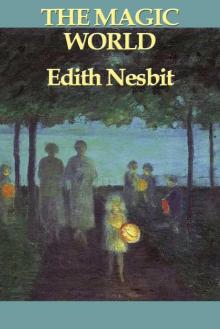 The Magic World
The Magic World In the Dark
In the Dark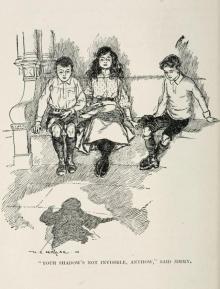 The Enchanted Castle
The Enchanted Castle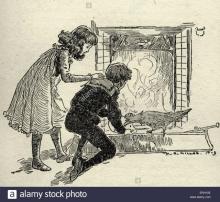 The Phoenix and the Carpet
The Phoenix and the Carpet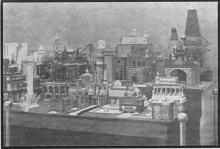 The Magic City
The Magic City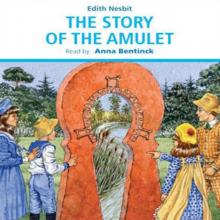 The Story of the Amulet
The Story of the Amulet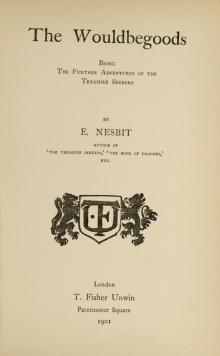 The Wouldbegoods: Being the Further Adventures of the Treasure Seekers
The Wouldbegoods: Being the Further Adventures of the Treasure Seekers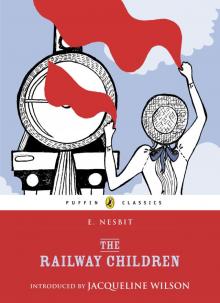 The Railway Children
The Railway Children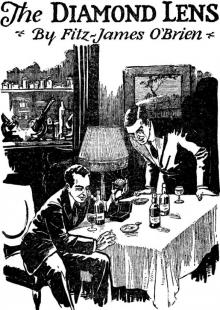 The Diamond Lens
The Diamond Lens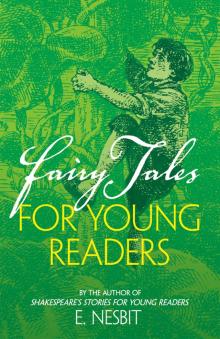 Fairy Tales for Young Readers
Fairy Tales for Young Readers Shakespeare's Stories for Young Readers (Dover Children's Classics)
Shakespeare's Stories for Young Readers (Dover Children's Classics)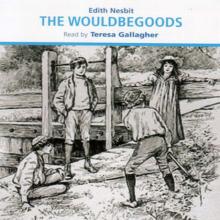 The Wouldbegoods
The Wouldbegoods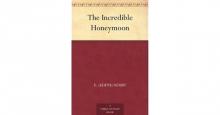 The Incredible Honeymoon
The Incredible Honeymoon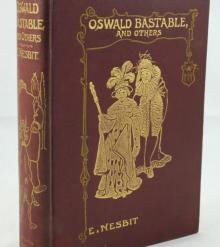 Oswald Bastable and Others
Oswald Bastable and Others Pussy and Doggy Tales
Pussy and Doggy Tales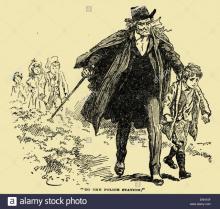 New Treasure Seekers; Or, The Bastable Children in Search of a Fortune
New Treasure Seekers; Or, The Bastable Children in Search of a Fortune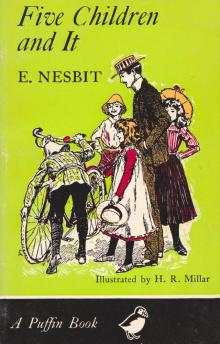 Five Children and It
Five Children and It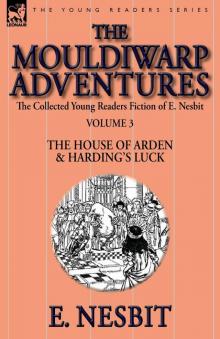 Harding's luck
Harding's luck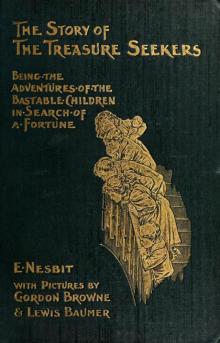 The Story of the Treasure Seekers
The Story of the Treasure Seekers The E. Nesbit Megapack: 26 Classic Novels and Stories
The E. Nesbit Megapack: 26 Classic Novels and Stories Shakespeare's Stories for Young Readers
Shakespeare's Stories for Young Readers